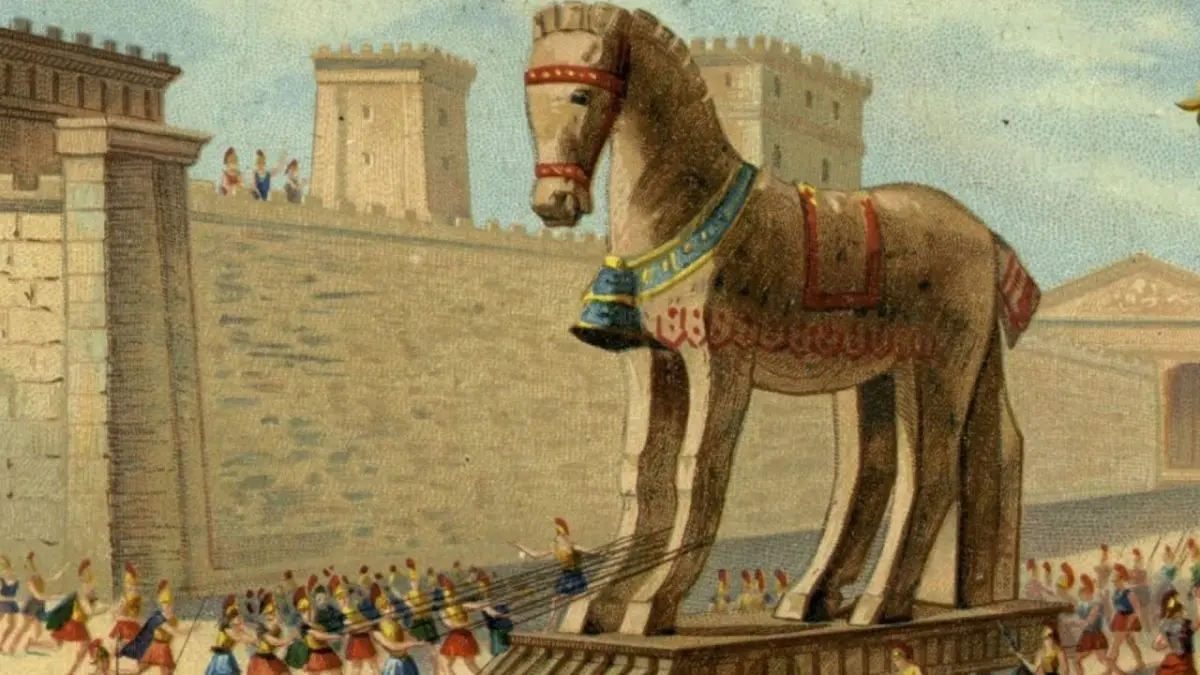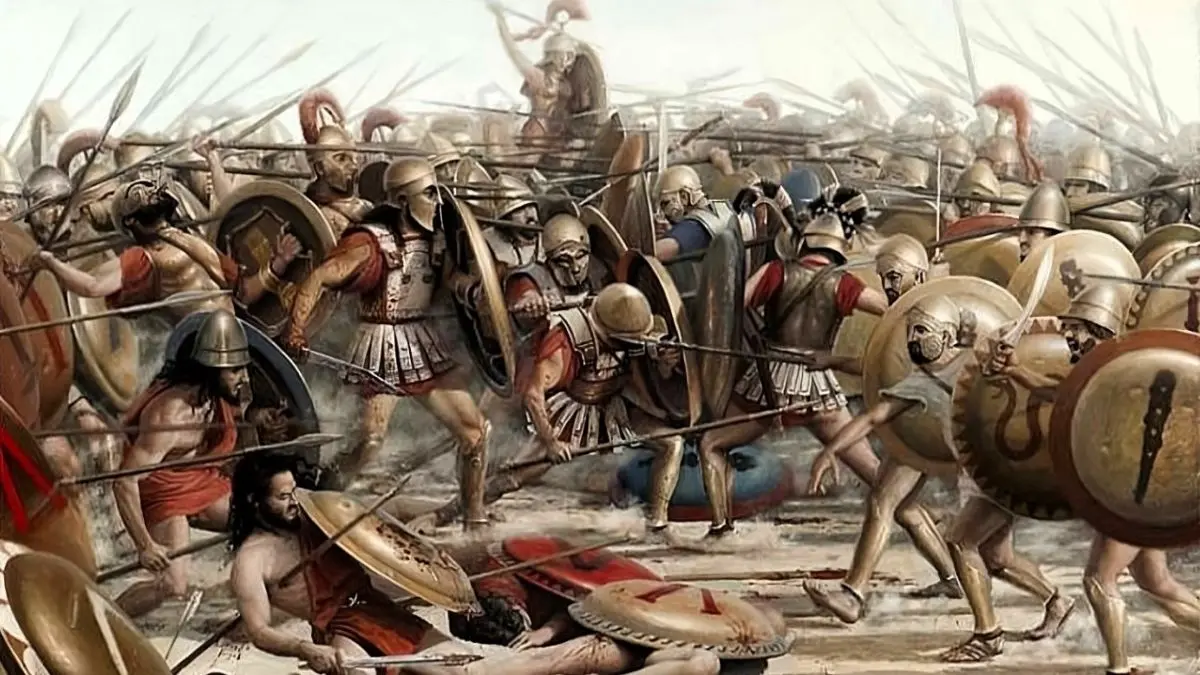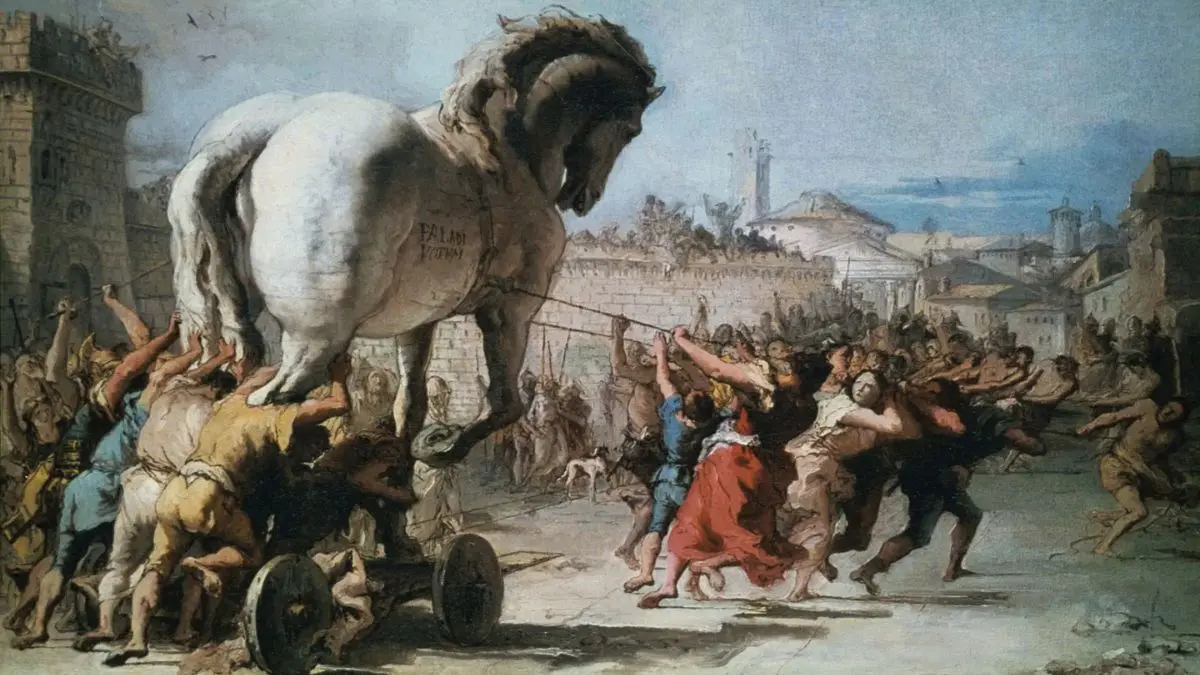The story of the Trojan War, a blend of myth and history. This epic conflict is believed to have taken place around the 12th or 13th century BCE, involving the city of Troy (located in modern-day Turkey) and a coalition of Greek city-states. The primary source for this tale is Homer’s “Iliad,” supplemented by other ancient texts like Virgil’s “Aeneid” and various Greek plays and historical records.
The Seeds of Conflict
The roots of the Trojan War lie in a mythological tale involving divine beings and mortal pride. According to legend, the war’s inception can be traced back to the marriage of Peleus, a mortal king, and Thetis, a sea goddess. All the gods were invited to the wedding except Eris, the goddess of discord. Angered by this exclusion, Eris threw a golden apple inscribed with “To the fairest” among the goddesses, prompting a fierce dispute between Hera, Athena, and Aphrodite over who deserved the title.
To settle the argument, the goddesses turned to Paris, a Trojan prince, for judgment. Each goddess offered him a bribe: Hera promised power, Athena promised wisdom and skill in war, and Aphrodite promised the love of the most beautiful woman in the world, Helen, who was already married to King Menelaus of Sparta. Paris awarded the apple to Aphrodite, setting in motion a series of events that would lead to war.
The Abduction of Helen
Helen’s abduction by Paris is the most famous catalyst for the Trojan War. Paris visited Sparta under the guise of diplomacy, where he met and fell in love with Helen. Whether she left willingly or was abducted by Paris varies in different versions of the story, but her departure to Troy with Paris enraged Menelaus. Menelaus sought the aid of his brother Agamemnon, king of Mycenae, who rallied the Greek kings and heroes to launch an expedition against Troy to retrieve Helen and restore his brother’s honor.

The Battle of Troy
The Greek Expedition
The Greek coalition, known as the Achaeans, was composed of some of the most legendary figures in Greek mythology, including Achilles, Odysseus, Ajax, and Nestor. Their fleet, numbering over a thousand ships, set sail for Troy, initiating a war that would last a decade.
The Siege of Troy
The “Iliad” covers only a few weeks in the final year of the Trojan War, focusing on the wrath of Achilles and its consequences. However, it provides vivid details of the prolonged siege and the battles fought outside the city’s walls. The Greeks established their camp on the shores near Troy and laid siege to the city, engaging in numerous skirmishes and battles with the Trojan defenders, led by Hector, Paris’s brother and Troy’s greatest warrior.
One of the war’s most famous episodes is the duel between Achilles and Hector. Achilles, enraged by the death of his close friend Patroclus at Hector’s hands, returned to battle and killed Hector in a dramatic fight. He then desecrated Hector’s body by dragging it behind his chariot around the walls of Troy. This act of vengeance highlights the brutal nature of the conflict and the personal vendettas that fueled it.
The Role of the Gods
The gods played a significant role in the Trojan War, frequently intervening in mortal affairs. Zeus, the king of the gods, tried to maintain a balance, while other gods took sides. Hera, Athena, and Poseidon supported the Greeks, while Aphrodite, Apollo, and Ares favored the Trojans. These divine interventions often influenced the course of battles and the fates of the warriors, adding a layer of complexity to the human struggles.
The End
The Fall of Troy
The war’s turning point came with the introduction of the cunning strategy devised by Odysseus: the Trojan Horse. Realizing that brute force alone would not bring victory, Odysseus proposed building a large wooden horse, hollowed out to conceal a select group of Greek warriors. The Greeks pretended to retreat, leaving the horse as an offering to the gods and a symbol of their supposed surrender.
The Trojans, believing the war was over and that the horse was a peace offering, brought it into the city despite warnings from some, including the priest Laocoön and the prophetess Cassandra. That night, as the Trojans celebrated their apparent victory, the Greek warriors emerged from the horse, opened the city gates, and allowed the returning Greek army to enter. The Greeks sacked the city, killing many inhabitants, including King Priam, and taking others, including women and children, as slaves.
The Aftermath
The fall of Troy marked the end of the war, but the Stories of the Greek heroes did not conclude there. The return journeys of these warriors, known as the “Nostoi,” were fraught with peril and adventure. The most famous of these tales is Homer’s “Odyssey,” which chronicles Odysseus’s ten-year journey home to Ithaca, filled with encounters with mythical creatures and divine challenges.
The fate of other key figures varied: Agamemnon returned home to a tragic end, murdered by his wife Clytemnestra and her lover; Menelaus and Helen eventually reconciled and returned to Sparta; and Aeneas, a Trojan prince, fled the burning city and, according to Roman mythology, eventually founded Rome.

Historical Basis and Legacy
While the Trojan War is steeped in myth, there is evidence suggesting it may have been based on a real conflict. Archaeological excavations at Hisarlik, the site believed to be ancient Troy, have revealed multiple layers of settlement, with one layer showing signs of destruction around the time traditionally associated with the war. Additionally, Hittite records from the 13th century BCE mention a city called Wilusa, which some scholars identify with Troy, and refer to conflicts involving a king named Alaksandu, possibly Paris.
The Trojan War has left an indelible mark on Western literature and culture. Its themes of heroism, betrayal, and the capriciousness of fate have inspired countless works of art, literature, and philosophy. From ancient Greek tragedies to modern films, the story of Troy continues to resonate, reminding us of the timeless nature of human conflict and the enduring power of myth.
Also Read: Top 10 Novels Inspired by Asian Mythology









